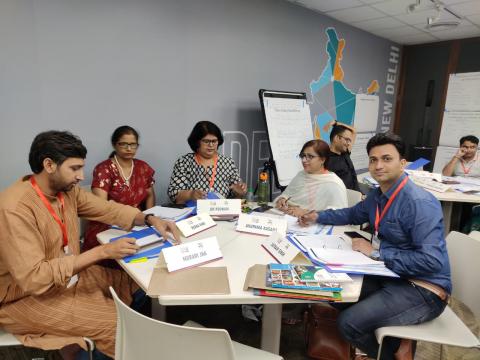
In search of an appropriate pedagogy in Gender Education
Our action emanates from our belief system and our belief system is greatly influenced by the knowledge we possess. Among the various social constructs that encompass our disposition about life, the idea of gender is explicit. We can see people acts as per the gender-based role and also carries the stereotype and bias related to gender. The gender-based role brings privilege to some people and also creates limitations for many people and thus, becomes discriminatory and exploitative.
In the last hundred years, there has been enough research in this domain. The idea that SEX is natural and gender is a social construct has been established academically. But in the general population, both are still taken as natural and thus nothing can be done about it. We have a tradition of scholarly work in this field. Many countries of the world also experienced the feminist movement which challenged the patriarchal dominance. It resulted in equitable legal provisions. This brought some relief to women and of course to men as well. However, the contest is between the cultural tools and the modern knowledge system. Cultural tools appear to be dominant.
One of the reasons, I see why it’s not making inroads into the mass, is the failure of pedagogy. We remained focused on scholarly work but how to take it to the masses, remains ignored. Yes, we worked on our textbooks, but we ignored our teachers. We allowed our powerful cultural tools, i.e Cinema and Music to continue to spread the sexiest thinking. In this article, I am dealing with the pedagogical aspects. Bringing change to cinema and music is beyond the preview of this article.
Quoting my example! I got exposed to a rich variety of literature on gender. At TISS, Mumbai, I selected Gender Studies as my elective paper and read some of the finest research articles. The two I still remember are; Looking through the glass and Castes in India. In the 1st, Nandini Bhattacharya explains how in daily classroom rituals we reinforce gender roles. In the second one, Ambedkar argues, how Indian Society has complete control over women's sexuality and how it ensures the transfer of wealth from one generation to another generation. I read a fantastic book, The weave of my life. This depicts the journey of Anita Pawar, a Dalit feminist writer. Recently, I read Choodi Bazar Me Ladki ( A girl in the bangle market) by Krishna Kumar. The book provides a powerful explanation of how cultural tools play an extremely important role in preparing Indian women to succumb to patriarchal supremacy. And now reading the magnum opus of Feminism, The second sex by Simone de Beauvoir.
The reason I gave this description is to establish that I have access to most of the ideas on this issue. The challenge is…the transaction! Unfortunately, after a decade in this field, for the 1st time, I am attending training which is discussing the pedagogical aspects of gender discourse. In the 4 days, I haven't come across an idea that I was not aware of. But I am overwhelmed by the classroom management, content, case studies, inquiry questions and planning on how to take this issue to children. The only person, I know whose work I have used in my classroom is Kamla Bhasin. Her book- Ladka Kya hai or Ladki Kya hai (Who is a boy and who is a girl) makes it easier for the teacher to initiate the conversation.
The systemic understanding of the pedagogic aspects of gender sensitivity is important and Meghan, a gender expert from the USA, is leaving no stone unturned to take us through this journey. One of the most important aspects of pedagogy is classroom management and the participation of the learner. The greater the participation the higher the learning. Group teaching is at the core of classroom management. She has ensured that the class doesn't have a centre thus flip charts are placed at different corners and she moves from one point to other points. The learner has equal access to the teacher even in terms of proximity to the teacher.
She ensures that she knows each participant by his/her name. For each session, she got defined objectives and a detailed roadmap of the process to achieve the objective. At the beginning of the session, she flags the objectives of the session and in the end, she brings the participants to the objectives and asks them to check whether we achieved them or not.
The objectives are well defined. For example
Session learning objectives for the day one were;
- Participants describe how local gender roles are formed and demonstrate their understanding of sex versus gender by identifying two examples each.
- Participants practice respectful and inclusive norms as they analyse three statements about gender-based violence
- Participants discuss three types of school-related gender based-violence and consider their emotional and health effects on students.
[Source-Students Friendly schools: Session: what is gender-based violence| Version: May-2022| page 17 of 31]
The pedagogical aspects of a concept may not be as exciting as the epistemic aspects of the concept but, this is the area where the focus needs to be shifted. Our teacher training institutes need to identify a clear-cut difference between the content and the pedagogy. The content delivery should not be mistaken for pedagogy. A quote from one of the greatest educational thinkers, John Dewey may help us identify the difference and the importance. In his book, Democracy and education, he writes “We cannot say we have sold something unless someone has bought it; we cannot say we have taught something until someone has learned it” This statement Dewey illustrates why we need to shift our focus from content delivery to pedagogy.
- Log in to post comments
